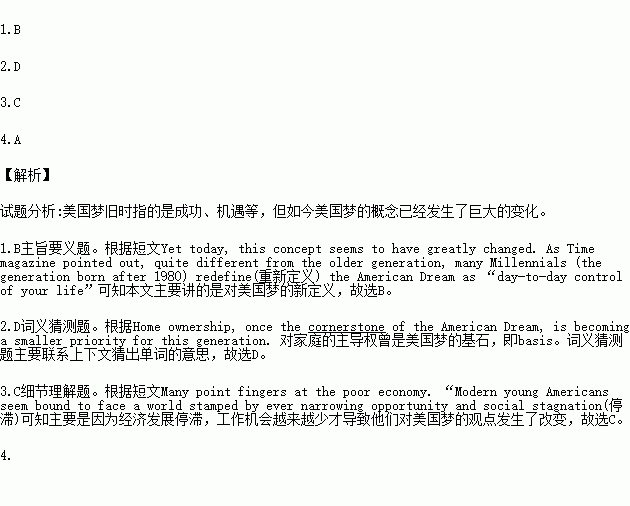题目内容
You may have heard of the American Dream, an ideal that has powered the hopes of Americans for generations.
It began as a belief that the US was a land of opportunity, and that anyone could achieve success through hard work. At times, the dream has referred to home ownership, a good job, retirement security or each generation doing better than the last.
Yet today, this concept seems to have greatly changed. As Time magazine pointed out, quite different from the older generation, many Millennials (the generation born after 1980) redefine(重新定义) the American Dream as “day-to-day control of your life”. They “prize job mobility, flexible schedules, any work that is more interesting than typing, and the ability to travel”, said the magazine.
Home ownership, once the cornerstone of the American Dream, is becoming a smaller priority for this generation. Meanwhile, nearly 40% of them choose travel as part of their dream. And entrepreneurship(创业) is a rising favorite, as nearly 26% of Millennials consider self-employment as part of their dream.
So what has led to this huge change?
Many point fingers at the poor economy. “Modern young Americans seem bound to face a world stamped by ever narrowing opportunity and social stagnation(停滞),”noted The Daily Beast.
“The rate of 16-to 24-year-olds out of school and out of work is unusually high at 15%. Many college graduates have taken jobs that don’t require a degree,” Time reported.
The magazine worries that these difficulties may lead to a lost generation who are “unable to ever truly find their feet on the corporation’s ladder”.
Dan Kadlec, a reporter of Time, sees Millennials as resetting their expectations. “This situation is different for young adults today,” he wrote. “A true American dream has to feel attainable, and many Millennias are feeling they can only attain a day-today lifestyle that suits them.”
1.What’s the passage mainly about?
A. Meaning of American Dream
B. Redefinition of American Dream
C. Value of Achieving American Dream
D. History of Changing American Dream
2.The underlined word “cornerstone” in Paragraph 4 is closest in meaning to “ ”.
A. growth B. balance C. purpose D. basis
3.According to the passage, what has changed Millennials’ view of the American Dream?
A. A lack of confidence in themselves
B. Fierce competition in the job market
C. The discouraging economy and unemployment
D. Their dissatisfaction with the government
4.Dan Kadlec thinks Millennials’ new definition of the American Dream is ______.
A. understandable B. beautiful
C. worrying D. Positive
 优百分课时互动系列答案
优百分课时互动系列答案 开心蛙状元作业系列答案
开心蛙状元作业系列答案
